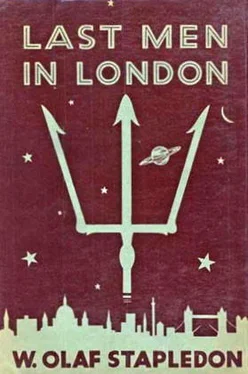In a few days Paul was reconciled to his fate to such an extent that he began eagerly to debate with himself how he should gratify the new passion which hitherto he had only with difficulty restrained. The fervour with which he embarked on his task combined the lusty hunger of an appetite with the exaltation of a sacred duty.
I further prepared him by making him realize that his recent experience on the Down was the vital spark lacking to all typical modern thought, the missing and all-relevant word without which its jumble of verbiage could never make sense, the still small voice which alone, working in each heart, could ever bring peace to the modern world. Paul knew, of course, that this experience of his was by no means unique. Other ages had more profoundly entered into it. Even in his own age it sometimes occurred. But it had played little part in the common life of the mind; the few who had known it had nearly always withdrawn into their inner fortress. Disengaging themselves from the dross which confuses modern thought, they had at the same time unwittingly rejected a treasure which had never before come within man’s reach. Contenting themselves with vain repetitions of old truths, they were deaf to the new truth which was as yet but stammeringly expressing itself in men’s minds. They could see very clearly the central error of the modern spirit, namely, the belief that reality is wholly included in the world of sense. Revolting from this folly, they erroneously declared this world a phantom and a snare, and naively conceived that in their ecstasy the soul, escaping from illusion, found herself at last untrammelled and immortal. I was at pains to make Paul see unmistakably that, for those who have entered superficially into the life of the spirit, this is the most insidious, the most lethal of all snares.
On the day after his illumination upon the Down, Paul had told himself that he had escaped from the foundering vessel of himself. The swarms of his fellow men and women all over the world could do nothing but labour incessantly from wave to wave of the maelstrom, pausing only now and then on some crest to look around them and realize that they were ploughing a waste of waters; and that one and all must sink. Paul saw them tormented by self-prizing; though also more nobly tortured and exalted by personal love, and by the intensified pain of watching the beloved’s pain. This it was, indeed, that chiefly dignified them above the beasts. But this also it was that tethered them to the waste of waters, like foundering may-flies. Their interest was almost wholly personal, either in self-regard, or hate, or love; but increasingly they saw that in the waste of existence there could be no lasting home for personal spirits anywhere, and so no permanency of comfort for anyone’s beloved. Each of them, and each beloved, must settle heavily down into old age, like leaky vessels. If only they could have sunk in battle array fighting for some great cause! But their sailing orders had not come through to them, or had been so mutilated that they found no clear direction.
Thus Paul had figured things out on the day after his illumination. By some miracle he himself, seemingly, had escaped from the foundering vessel of himself. He had escaped simply by a leap of the imagination, a soaring flight into the upper air; whence, selfless, he could watch the shipwreck of himself and all selves with a strange, still compassion, but without revolt. Yet subsequently, under my continued influence, he saw that this image was false and dangerous. He had not escaped. No self could escape. And now at last he realized that escape was not desirable. For he had seen something of the beauty for which all selves, if they could but see it, would suffer gladly, and gladly be annihilated.
Paul now once more turned his attention to the world that it was his task to observe. Suddenly a truth, which he had long vaguely known, but had never before clearly stated to himself, became both clear and urgent. At last he saw the situation of his species unambiguously from the cosmical point of view. He saw what it was that he and his contemporaries should be doing with their world. Fate had given them an opportunity which had been withheld from every early age. They had stumbled on the power of controlling the destiny of the human race. They had already gained some mastery over physical nature, and a far greater mastery was seemingly in store for them. Already their world had become one world, as it had never been before. Moreover, they must some day learn how to remake human nature itself, for good or for ill. If they could begin to outgrow their limitations of will, if they could feel beyond their self-regard, their tribal jealousies and their constant puerile obsessions, then they could begin not only to construct a Utopia of happy individuals, but to make of their planet a single and most potent instrument of the spirit, capable of music hitherto unconceived.
What humanity should do with itself in the far future, no one could tell; but one conviction now stood out with certainty in Paul’s mind, namely, that over all the trivial and inconsistent purposes that kept the tribes of men in conflict with one another, there was one purpose which should be the supreme and inviolate purpose of all men today, namely, to evoke in every extant human being the fullest possible aliveness, and to enable all men to work; together harmoniously for the making of a nobler, a more alive human nature.
Some such purpose as this was obscurely dawning in many minds throughout the Western and even the Eastern world. But though they were many, they were a minute proportion of the whole; and their vision was unclear, their will unsure. Opposed to them were many violent powers, and the dead-weight of custom, not only in the world but in themselves also. What chance was there that these few groping minds would wrench the great world into a new way of living? Paul now with eager interest, nay with passion, with awe, with grim zest, took up his task of watching and assessing the intense little drama of your age.
Lest he should lose sight of the wider bearings of that drama, Paul first meditated on the cosmical significance of human endeavour, which now for the first time was beginning to be tentatively apprehended by man himself. The immediate outcome of his meditation was this poem:
Is man a disease
that the blood of a senile star
cannot resist?
And when the constellations regard us,
is it fear, disgust, horror,
(at a plague-stricken brother
derelict from beauty),
that stares yonder
so sharply?
Gas the stars are.
They regard us not,
they judge us not,
they care for nothing.
We are alone in the hollow sky.
Then ours, though out of reach, those trinkets,
withheld,
unspoiled;
ours the sleeping and uncommanded genii
of those old lamps;
ours by right of mentality;
by right of agony,
by right of long heart-searching,
by right of all we must do with them
when our day comes,
when we have outlived our childishness,
when we have outgrown
the recurrent insanity of senility.
Then surely at last man
and not bickering monkeys
shall occupy the universe.
Paul now devoted all his leisure to his great exploration. He began tentatively, by reading much modern literature, and talking politics and philosophy with his friends. Both these occupations were of course familiar to him; but whereas formerly they had been pursued in the spirit of the tourist, a rather bewildered tourist, now they were carried out with passion and an assurance which to Paul himself seemed miraculous. This beginning led him on to make a careful study of the mentality of the whole teaching profession, both in schools and universities; and this in turn developed into a wide and profound research into all manner of mental types and occupations from road-menders to cabinet ministers. With my constant help, and to his own surprise, the silent and retiring young schoolmaster, who had always been so painfully conscious of the barrier between himself and his kind, began actively to seek out whatever contacts promised to be significant for his task. With amazement he discovered in himself a talent for devising inoffensive methods of making acquaintance with all sorts of persons whom he needed for his collection. Indeed, he pursued his work very much in the spirit of a collector in love with his specimens, and eager to discover by wealth of instances the laws of their being. If one day he happened to conceive that such and such a well-known personage or humble neighbour could give him light, he would be tormented by a violent, almost sexual, craving to meet the chosen one, and would leave no stone unturned until he had achieved his end.
Читать дальше












